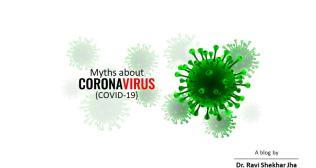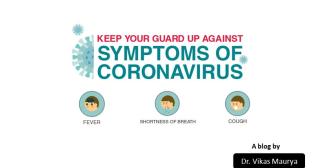
What Is Coronavirus?
 About Coronavirus:
About Coronavirus:
Coronavirus is the most talked about topic nowadays as people are concerned over the spread of Coronavirus. The coronavirus got its name because it resembles the shape of a crown. The coronavirus belongs to the SARS family (severe acute respiratory syndrome), which had also originated from China, around a few years back. Although, SARS and Coronavirus belong to the same family of viruses, there are still some significant differences between the two. Some of these differences are as mentioned:
- Mortality rate for SARS was around 10%, however, for Coronavirus, is less virulent with mortality rate is around 2.5 – 7.5%.
- Coronavirus causes serious illness in 15- 20% of the patient.s Hence, around 1 in 5 people, infected from coronavirus, have a chance of being admitted to ICUs and around 1 in 5 ICU patients have an increased probability of death.
- Coronavirus is highly infectious as compared to the SARS virus as a single Covid-19 infected patient can transmit infection to three other people. Infection can also spread through asymptomatic patients, meaning that the patients, who do not have any symptoms but are infected by coronavirus, can also spread the infection to other people.
- Coronavirus is spreading very fast and is becoming difficult to contain.
The symptoms of coronavirus are somewhat similar to a common viral infection such as Fever (most commonly seen), cough, phlegm, sometimes blood while coughing, breathing difficulties, respiratory distress and diarrhea (in rare cases).
In case of minor illness, the patient can be cured by symptomatic treatments or by a regular viral fever treatment. However, the patients with serious symptoms are advised to get admitted to the hospital, where special supportive care can be provided to the patient. In case of emergencies, the patient can be put on oxygen or a ventilator.
Currently, no approved treatment options are available for coronavirus, however, clinical trials are ongoing, across the world, for some drugs, which can be potential treatment options for coronavirus.
Preventive Measures:
In the absence of targeted treatments, precautions and preventative measures are important in preventing coronavirus spread. Some of the important precautions and hygiene factors, which need to be kept in mind by every individual, are as mentioned:
- Avoid touching your face, eyes and nose unnecessarily.
- Wash hands frequently
- Avoid going to crowded places
- Avoid non-essential international and domestic travels
- Avoid shaking hands and unnecessary hugging people instead greet them with ‘Namaskar’.
- Avoid going into high-risk areas
- Avoid coming in contact with any infected person
- People who are suffering from cold, cough or fever are advised to stay at home, avoid going out and wear masks all the time.
As per the W.H.O. recommendation, the healthy individuals should not wear masks. The reason, which makes the masks counterproductive for individuals is that the masks when worn should form a proper seal and should be airtight but the people keep shifting the masks up and down on the face and touch the external surface of the mask to adjust it and then touch their eyes and face with those bare hands. This can lead to the spread of infection and can be highly dangerous in today’s time of COVID-19 spread.
Hence, these masks should be left for use only for the high-risk individuals suffering from diseases such as diabetes, cancer, immunocompromised hosts, those with heart, lung or any other chronic diseases.
To know about the same information in Hindi language, please watch this video (Click Here) Dr. Manoj Kumar Goel, Director and Unit Head, Pulmonology at Fortis Memorial Research Institute, Gurugram.
Categories
Clear allਡਾਕਟਰ ਨੂੰ ਮਿਲੋ

- Pulmonology | Pulmonology
-
28 Years
-
1900
 Available at 1 different locations
Available at 1 different locations

















}}drupal-data/images/blog-lists.png)


